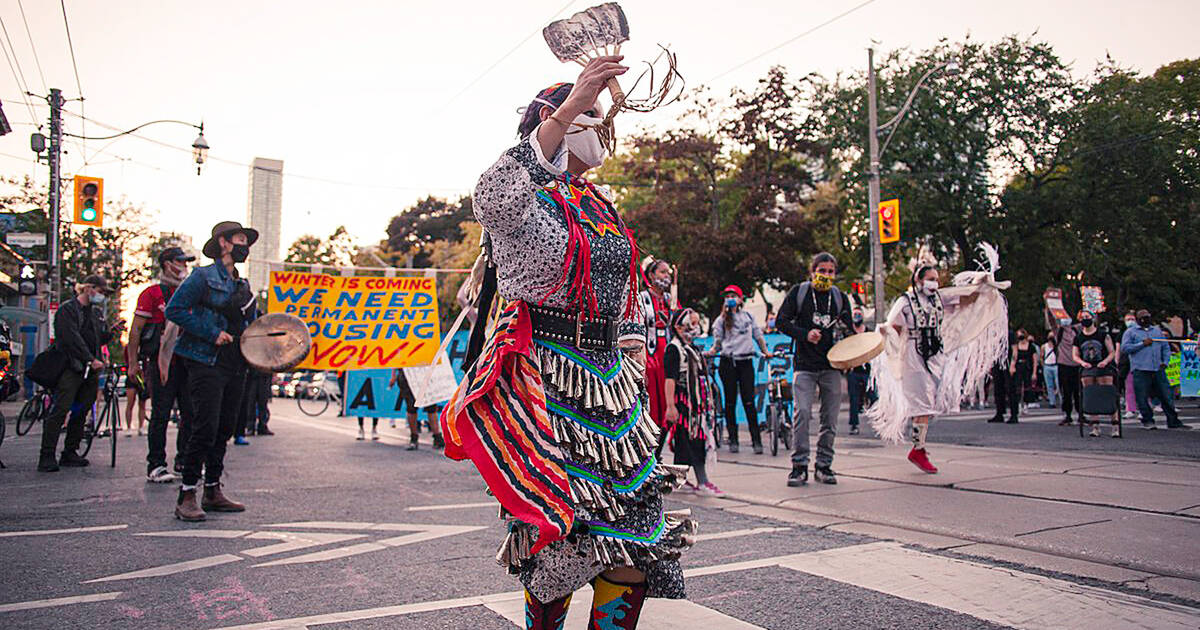
Hundreds of activists and advocates marched through downtown Toronto yesterday calling for more affordable housing as well as a commitment from the city to support those experiencing homelessness this upcoming winter.
No more than that! https://t.co/AMGpcFQ6wJ
— Gary Kinsman (@GaryWKinsman) September 24, 2020
The event, organized by the Encampment Support Network (ESN), included a meal served to those experiencing homelessness at Moss Park as well as a march, music, art and speakers such as well-known activist Desmond Cole.
Listen as the incredible @DesmondCole speaks over the protest art of @ESN_TO at tonight’s march for housing.
— Ennis Esmer (burgers) (@ennisesmer) September 24, 2020
Toronto, we should do what he says.
Councillor @joe_cressy, will you commit to ending the criminalization of the city’s encampments? pic.twitter.com/QgQhmWPLdL
Members of ESN have been working tirelessly to provide basic supports to those living in encampments for the past 14 weeks, including food, water and sleeping bags, but the group says with winter on the horizon and no end in sight for the pandemic, people need permanent housing now more than ever before.
To help get this message across, Wednesday's protest included performance art that projected the words "This should be housing" and "The housing crisis is a real estate game" on the side of empty buildings — many of which are owned by WE Charity.
shout out to @ESN_TO
— Michael DeForge (@michael_deforge) September 24, 2020
expropriate these buildings (WE real estate!) and use it as housing! pic.twitter.com/SsY9Vhtr1E
Advocates say these buildings should be immediately expropriated and transformed into affordable housing.
“The housing crisis is a real estate game.” Projected onto empty buildings that could be homes for encampment residents. Amazing protest @ESN_TO #expropriate #nomorehomelessdeaths #TOpoli pic.twitter.com/39tofCPhBi
— Lesley Wood (@lesleybikes) September 24, 2020
The group also has six immediate demands they say the city must consider to protect the health and safety of the precariously housed as winter approaches:
- Invest in actual affordable housing, obtain vacant buildings to turn into housing and create 10,000 units of rent-geared-to-income housing over the next 24 months
- Immediately enforce an eviction moratorium
- Immediately end the criminalization of encampments and issue a moratorium on clearing encampments
- Introduce robust overdose prevention and harm reduction services in all shelters and supportive housing sites
- Immediately ensure there is enough emergency shelter space until there is sufficient affordable housing (2,000 more rooms before winter)
- Immediately provide winter survival gear for those in encampments
Shoutout to our friends @ESN_TO for organizing today’s meal and march for housing at Moss Park. This team of folks have been delivering basic supplies to their unhoused neighbours for over three months. We need to take care of one another. pic.twitter.com/SZsi8Kl7qw
— Friends of Chinatown TO (@chinatownFOCT) September 24, 2020
Toronto's homelessness and housing crisis has become increasingly obvious over the past several months as the pandemic has pushed many out of the shelter system and into encampments.
"Encampments are peoples' emergency option — whether it's a response to the housing crisis, the COVID crisis or the OD crisis — encampments are peoples' only options," ESN told blogTO earlier this month.
"The shelter system was already full before COVID-19. In order to respect physical distancing, most shelters had to reduce capacity, so people were pushed out of the system... but there have always been encampments, even before COVID-19."
The city, meanwhile, has not yet announced a set winter strategy for the homeless.
They have been working to move residents into the shelter-hotels established during the pandemic for several months, some of which will remain open until at least April, but many still prefer to live outside rather than in a shelter due to safety concerns, hostile neighbourhoods and a lack of independence.
We know that people have been dying in shelter-hotels, and from #overdose. In July, @cityoftoronto experienced 27 OD-related deaths. The shelter system experienced 13 deaths, the highest ever since 2007, although it's unclear — albeit likely — these were from OD. pic.twitter.com/y5JwRkXL8t
— Toronto Drop-in Network (TDIN) (@TODropinNetwork) September 23, 2020
The city also recently recommended a plan to build 3,000 affordable rental and supportive homes over the next 24 months, and the federal government later announced a plan to provide $1.2 billion to cities across Canada for modular homes.
But ESN says if we want to prevent those without housing from freezing to death this winter, immediate action is required.
"We watch our friends and neighbours go without shelter, food, and water, be targeted by police, be criminalized and die," the group says. "People need permanent housing in their communities, now."
by Mira Miller via blogTO

No comments:
Post a Comment